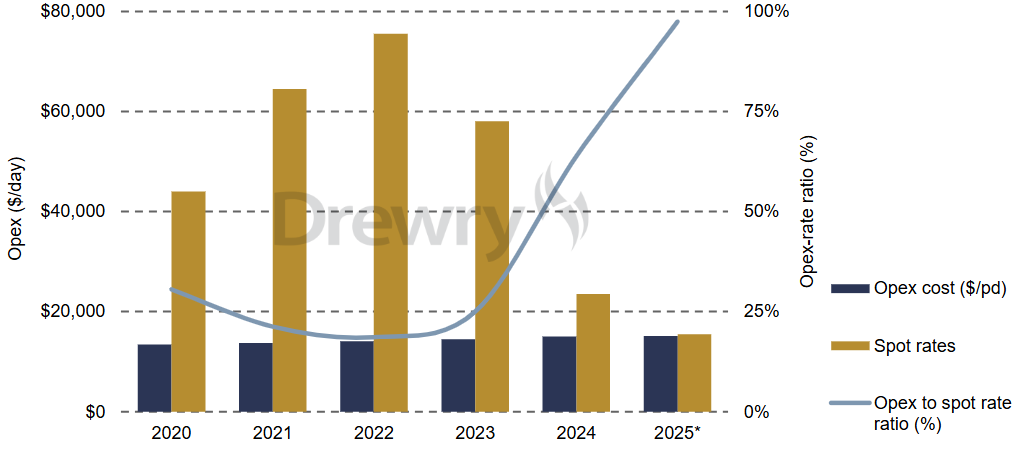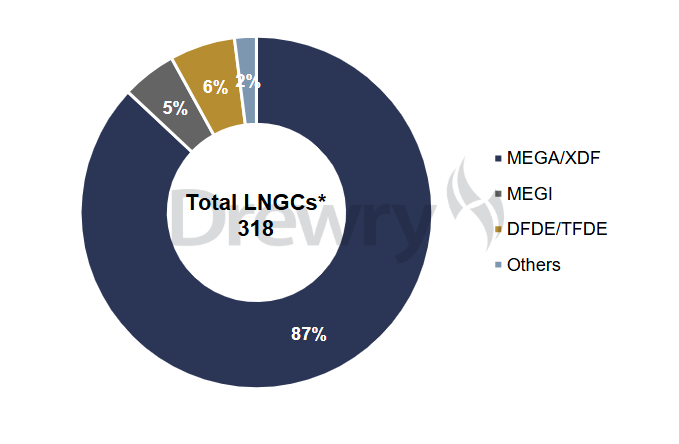Drewry presents insights regarding the growing risks for steam turbine carriers, including rising environmental scrutiny, low rates, and accelerated scrapping, all threatening their economic viability.
As explained, increasing environmental scrutiny and rising unpredictability pose a great risk to steam carriers. Drewry expects several carriers to be scrapped much faster than expected earlier. Demolitions rose in 2024 as charter rates slumped, especially for steam carriers, which hit rock bottom, questioning their economic feasibility and future. The bearish market sentiments are aggravating the woes of LNGC shipowners, with the demolition age reducing. Moreover, growing regulatory risks will make steam carriers redundant.
Steam carrier rates hit a historic low in 2024; a similar trend is likely in 2025
Spot rates for steam carriers averaged $23,000pd in 2024, plummeting to $5,000pd by the end of 2024, recording a historic low. Subdued demand in Europe, weak competition between Europe and Asia, ample vessel supply, and limited capacity addition squeezed rates across all engine types—steam, TFDE/DFDE and MEGA/XDF. Moreover, the oversupply of vessels outpaced the increased tonne-mile demand generated due to the re-routing of LNGCs via the Cape of Good Hope (COGH), with steam carriers failing to reap any benefits from longer voyages. This trend is likely to continue in 2025-26, with rates for steam carriers remaining lower throughout the year.
Charters will likely become more reluctant to deploy steam carriers as it will incur substantial costs. While some shipowners remain hopeful of any reversal of the current market conditions, the cost embedded with lay-ups and increasing market uncertainty could influence their decision.
Steam carriers becoming uneconomical
The fall in rates questions the economic feasibility of these carriers as they are unable to cover operating costs, increasing idle vessels as these carriers come off their charter with negligible chances of finding employment opportunities. The cost differential (of about 16-17%) between 10-year and 15-year-old steam carriers is quite substantial, which is growing further and affecting the status quo of steam carriers.

Note: Ship operating cost is taken from Drewry’s Shipping Operating Costs 2024 Annual report; 2025 is an estimation based on Drewry’s forecast for steam carriers.
Some owners are also considering placing their ships in lay-up conditions, hoping that the vast liquefaction capacity expected towards the end of the decade will generate demand. Although Drewry expects a supply-demand squeeze, demand for steam carriers will still be low, and even after laying up the ships for three-four years (with the laid-up costs depending on condition), vessels might only get a short burst of employment, resulting in vessel owners bearing the cost.
Moreover, Drewry expects older steam carriers to find conversion opportunities as the demand for FSRUs and FSUs is expected to be on an uptrend amid the rising energy security concerns and growing LNG supply. However, only a few will be qualified to be potential conversion candidates, given the technical feasibility and the vast number of such carriers. Thus, lower rates, minimal employment and conversion opportunities will also support scrapping.
Steam carriers comprise 25% of the current fleet, acting as a buffer and exaggerating the oversupply conditions. Drewry expects demolitions to accelerate in 2025, and this momentum will continue in the following years, reinstating a steady rebalance to the ongoing oversupply market conditions. However, demolitions could face some headwinds amid concerns over perlite disposal and easing steel prices.
Growing environmental scrutiny impacts LNG shipping
The increasing environmental scrutiny has started impacting LNG shipping as vessels slow steam and market fragmentation (based on engine type) is underway.
According to Drewry AIS, the average speed of LNGCs has been reducing, signalling changes in LNG shipping to comply with maritime regulations, such as CII and EEXI. Steam carriers are expected to face the steep brunt of these regulations and become highly incompliant with the increasing scrutiny. While shipowners opt for slow steaming to keep up with regulations, Drewry believes this will not be a way out for steam carriers as speed reduction will become uneconomical after a certain threshold due to higher boil-off gas.
Meanwhile, the rising scrutiny on steam carriers with speed reduction becoming impractical will further question the employability of these carriers – especially as these carriers are coming off their long-term charter and will be primarily available for spot trading/charter.
According to Drewry AIS, market fragmentation is already underway, with steam carriers routing and trading towards Asia, as these vessels remain operable and capable of catering to any short-haul trade requirements.

Drewry expects these carriers to support short-haul or inter-regional trade, with a low possibility of them finding employment on long-haul routes. These carriers will be deployed towards Asia as trading in European waters is becoming challenging, with the rollout of regional regulations such as EU-ETS and EU-FEM.
Moreover, market fragmentation will be fuelled by second-hand transactions, with most steam vessels purchased by Middle Eastern and Asian players as they manage to sail through Asian waters due to Europe’s stricter regulations.
However, in the long run, steam carriers will struggle to find employment, even in Asia, as a greater emphasis on regulations will escalate shipping costs, making them highly incompliant environmentally and economically with low earning opportunities. Additionally, the growing environmental stringency coupled with the gloomy outlook for steam carriers has reduced the demolition age from 38 years in 2023 to 28 years in 2024, boosting scrapping.
A flurry of modern carriers will further push steam carriers out of business
Tight regulations are compelling shipowners to opt for modern carriers with lower emissions. About 95% of the ordered carriers will be equipped with XDF/MEGA engines, which are highly efficient compared to conventional engines.
Currently, MEGI/XDF provides the best solution for shipowners to tackle the growing regulatory risks. Several technological improvements and advancements are underway to reduce the amount of methane slip from these engines, which remains a concern, especially with the rollout of EU-FEM, as it accounts for the methane slip. Despite this, Drewry expects these modern carriers to be able to operate hassle-free, at least until 2035. Beyond that, employability will also depend on technological advancement and breakthroughs in improving engine efficiency.

About 50% of steam carriers will be demolished by the end of this decade
- Drewry projects more than 50% of current steam carriers to be demolished by the end of 2030, with some finding conversion opportunities. Modern carriers will replace these carriers, with high deliveries scheduled between 2024 and 2027. As the steam turbine carriers come off the charter, they invariably become idle with no re-employment opportunities. They also act as a ‘buffer’ in the total supply, further limiting any potential growth in rates.
- Some shipowners remain cautious and prefer laying up vessels to scrapping them (considering the upcoming liquefaction capacity build-up). However, growing uncertainty, rising scrutiny and increasing cost associated with lay-up challenge their strategy.
- Amid high operating costs and historically low rates, these carriers are losing their economic viability faster than expected, making them highly uneconomic. Moreover, the demolition age is reducing and regulations are becoming stringent yearly, making several vessels potential candidates for demolition.
- Drewry expects more than 100 candidates to be potentially removed by 2030, and considerable scrapping will be required to restore the supply-demand balance. Rates will start to stabilise in 2027 and follow an upward trajectory thereafter.
































































